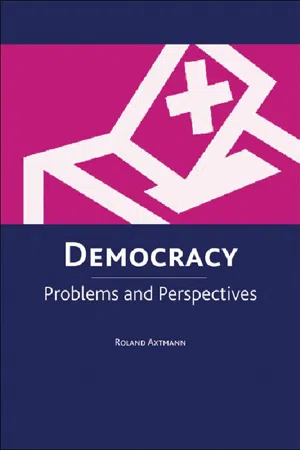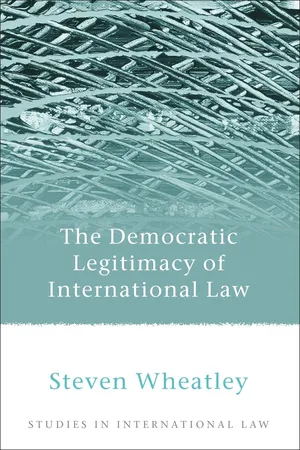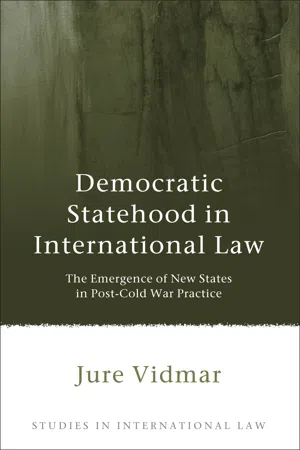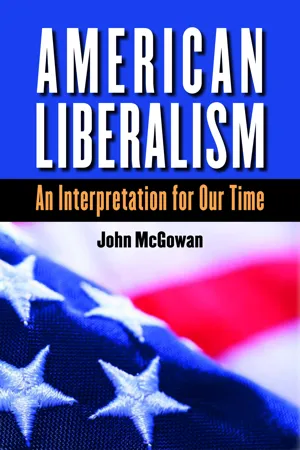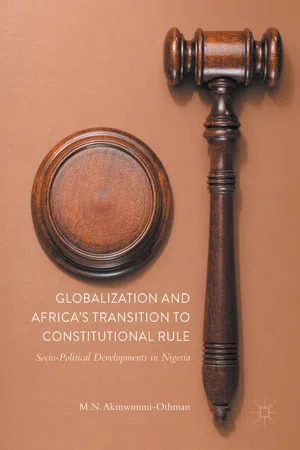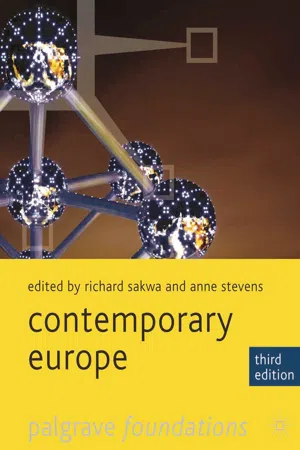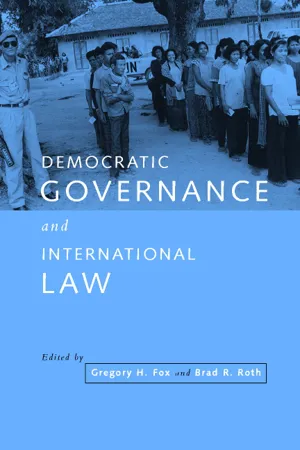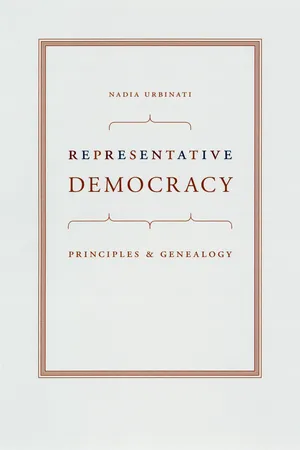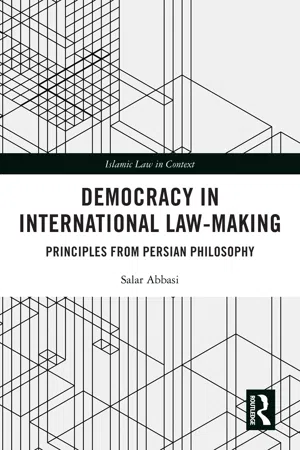Politics & International Relations
Democracy
Democracy is a system of government in which power is vested in the people, who exercise it directly or through elected representatives. It emphasizes the principles of political equality, majority rule, and protection of individual rights. Key features include free and fair elections, the rule of law, and respect for civil liberties and human rights.
Written by Perlego with AI-assistance
Related key terms
1 of 5
10 Key excerpts on "Democracy"
- eBook - PDF
Democracy
Problems and Perspectives
- Roland Axtmann(Author)
- 2007(Publication Date)
- EUP(Publisher)
As a form of government, Democracy is the best way of achieving these objectives . . . (para. 3) As a ‘form of government’, Democracy is understood to be built around the key institution of elections: The key element in the exercise of Democracy is the holding of free and fair elections at regular intervals enabling the people’s will to be ex-pressed. These elections must be held on the basis of universal, equal and secret suffrage so that all voters can choose their representatives in conditions of equality, openness and transparency that stimulate political competition. To that end, civil and political rights are essential, and more particularly among them, the rights to vote and to be elected, the rights of freedom of expression and assembly, access to information and the right to organise political parties and carry out political activities. (IPU Declaration, para. 12) 2 We have seen above that this institutional definition of Democracy as ‘representative Democracy’ based on elections and the institution of a parliament whose members have the requisite powers and means to express the will of the people by legislating, hold to account public officials, and ensure transparency of public life (paras 11, 14, and 15) prevails in all statements. It is an understanding of ‘Democracy’ that is quite similar to Robert Dahl’s conceptualisation of modern democ-racy as ‘polyarchy’. For Dahl (1998: 85–6), the political institutions of modern representative Democracy are: 1. elected officials who, as the representatives of the citizens, have control over government decisions about policy; 95 Democracy 2. free, fair, and frequent elections of these officials; 3. freedom of expression so as to enable citizens to express themselves on matters of concern to them; 4. access to alternative sources of information so that citizens may gather information not emanating from public authorities; 5. - Steven Wheatley(Author)
- 2010(Publication Date)
- Hart Publishing(Publisher)
The idea of Democracy rests on the twin principles of political equality and popular sovereignty: citizens participate on the basis of equality in a process of collective will-formation. There are a number of institutional arrangements that can give effect to these principles, although at the level of the state all will rely on free and fair elections to a representative assembly or parliament. Too often, the requirement to hold elections and respect the outcome becomes the sole test of democratic legitimacy, an approach that accords with theories of limited, or thin, Democracy. Joseph Schumpeter, for example, concludes that the role of the citizen in a Democracy is simply to determine who will hold power: Democracy is the rule of the elected politician, with elections regarded as a competitive process in which political parties offer their platforms and attempt to satisfy the largest number of preferences. 27 Elections provide one mecha-nism through which citizens participate in democratic politics, enabling them to express policy preferences and sanction office holders for poor performance by removing them from office. Elections provide the clear-est, if not necessarily the most accurate, expression of the popular will, which is also expressed through other forms of political participation, including protest, demonstration, and argumentation in political will-formation. The centrality of elections to democratic systems results from their ability to provide a (relatively) clear expression of the will of the people, reflected directly in a majority of votes cast or indirectly through the allocation of a majority of seats in a representative assembly. Elections are central to majoritarian conceptions of Democracy, in which legitimacy is provided by free and fair elections, and application of agreed rules for determining the identity of the candidates deemed to have ‘won’ (which is taken as a surrogate for winning the argument).- eBook - ePub
Democratic Statehood in International Law
The Emergence of New States in Post-Cold War Practice
- Jure Vidmar(Author)
- 2013(Publication Date)
- Hart Publishing(Publisher)
In sum, democratic political theory does not have a unitary definition of Democracy. The procedural definition understands Democracy in terms of the electoral process. In this understanding, Democracy can be expressed with a selection of civil and political rights, most commonly with the right to political participation and freedoms of speech and assembly. It is highly controversial as to whether Democracy is only a matter of electoral process. Therefore, the substantive definition of Democracy looks beyond the electoral process. However, as the critique of such a definition suggests, substantive Democracy can be a philosophical ideal, while it is not possible to define it by a set of legal prescriptions. Thus, in international legal parlance, references to Democracy are most commonly made with tenets of procedural Democracy in mind. Even if the procedural understanding is adopted and Democracy is primarily associated with free and fair elections, it still remains questionable whether international human rights law requires that such elections be held in a multiparty setting.2.2 Democracy and International Human Rights Law
2.2.1 Linking International Law and Democracy
The interdependence between human rights and Democracy makes international human rights law the most suitable framework for invoking Democracy as a principle of international law, but the word ‘Democracy’ does not appear in either the UN Charter or universal human rights instruments, nor has the International Court of Justice (ICJ) ‘based any of its decisions on the legal application of democratic principles’.89 Some international human rights instruments, however, make references to ‘democratic society’.Such a reference initially appeared in the Universal Declaration of Human Rights (UDHR),90 where the expression ‘democratic society’ is employed in the context of the limitation clause: human rights may be limited if the interest of ‘democratic society’ so requires. But how broadly does international law understand the adjective ‘democratic’? Its inclusion at the time of the adoption of the UDHR in 1948 could hardly reflect a customary rule of international law requiring a particular political system or electoral method. ‘Democratic’ at the time was hardly more than a synonym for ‘non-fascist’.91 Subsequently, the expression ‘democratic society’ found its place into a number of international human rights treaties, where it was also employed within the limitation clauses.92 - eBook - PDF
The Democratic Challenge
Rethinking Democracy and Democratization
- Jorge Nef, Bernd Reiter(Authors)
- 2009(Publication Date)
- Red Globe Press(Publisher)
70 Chapter 4 Popular Sovereignty, Citizenship and the Limits of Liberal Democracy We have now reached a point where we are able to analyse the different dimensions of Democracy as an ideal type and to appraise how close – or far – various political practices are in reference to this ideal. As stated earlier, Democracy is challenged from different sides, and new challenges have arisen, whereas old ones remain. The tension between liberalism and Democracy is certainly one of the oldest and most analysed, and yet most controversial, of the “old” challenges. The “new” world order and globalization have added a new twist to economic liberalism and led to a renewed interest in discussing the conflictive nature of this relationship. However, one question might be even more fundamental than the tension between Democracy and liberalism, and that is the question of citizenship. This chapter will thus turn to yet another of the traditional and “old” challenges to Democracy, namely the question of citizenship. Once a group of people establish that they, “the people,” shall be the sole source of all power exercised over them, they need to answer the first question that automatically grows out of such an assertion, namely: who are the people? In other words, the principle of popular sovereignty pro-duces the necessary corollary of citizenship and its limits. To adequately capture this challenge we need to start with an analysis of the principle of popular sovereignty, which will provide us with the basis to discuss citizenship. Popular sovereignty The most widely known definition of Democracy is that of Daniel Webster, later found in Abraham Lincoln’s First Inaugural Address of 1861: “the government of the people, by the people and for the people” (Bartlett, 1919). This implies a political system in which the people – a collective expression referring largely to commoners – are the main cause and prime effect of institutional organization. - eBook - ePub
American Liberalism
An Interpretation for Our Time
- John McGowan(Author)
- 2007(Publication Date)
- The University of North Carolina Press(Publisher)
Book Four: Democracy 1 Democracy AND LEGITIMACY In today’s world, Democracy is beyond criticism. It is the only form of government recognized as legitimate even while liberalism is scorned from right and left. Yet the rhetoric of Democracy often masks deeply undemocratic practices in sitting governments and among social elites. Even among those who are sincerely democratic, the articulation of what Democracy entails is neither precise nor demanding. It seems to be taken for granted that we all know what Democracy looks like and what it is for. Democracy is presented as self-evident; we automatically know what counts as democratic or not, and the good of Democracy is similarly self-evident. What does Democracy mean? The first—and often, it seems, the only—specific answer offered is “free and fair elections.” Why are elections so crucial? They have become the standard mechanism through which the people express their opinions, their will, or their consent. This formula provides one crucial principle of Democracy: ultimate authority rests in the people. Government only acquires and maintains legitimate authority over the governed if the people, as the source of authority, give that authority to the government and periodically reaffirm that giving. Elections have become the sign of Democracy because they offer, at minimal inconvenience, each citizen a voice. Each step further up the ladder of political involvement finds less and less people involved, since it takes time, energy, money, and commitment to become actively engaged. Even the minimal bother of casting a vote is not worth it to large percentages in many democracies. (Making registering to vote easier and either restoring election day as a holiday or extending voting over a four-day period that includes Saturday and Sunday are expedients worth trying to increase participation.) But even where voter turnout is low, elections are crucial because they signal the government’s willingness to place itself on the block - eBook - PDF
Globalization and Africa's Transition to Constitutional Rule
Socio-Political Developments in Nigeria
- Mohammed Nurudeen Akinwunmi-Othman(Author)
- 2017(Publication Date)
- Palgrave Macmillan(Publisher)
33 The African Union (AU) Charter on Democracy, Elections, and Governance in Africa (Article 3) identifies the following principles for a system to be accepted as democratic: regular, transparent, free-and-fair elections; representative government; respect for human rights; separa- tion of powers; popular participation; and constitutional transfer of polit- ical power. In Article 21 of the Universal Declaration of Human Rights (UDHR), it was stated that: ‘The will of the people shall be the basis of the authority of government’. Similarly, the Chambers dictionary gives the definition: ‘A form of government in which the supreme power is vested in the people collectively, and is administered by them or by the officers appointed by them’. 34 24 M.N. AKINWUNMI-OTHMAN According to Dyzenhaus (1998), 35 a concept of a liberal-democratic system has three constitutive principles. These are the principle of par- ticipation, which guarantees each individual a role that allows him or her to participate or make a difference to the character of political decision; the principle of equal stake, where every individual is treated as equal under any collective decisions to count as a full member of the political community; and the principle of independence, which allows each mem- ber of the political community to see moral and ethical decisions as their responsibility, rather than the responsibility of the collective unit. A survey of the different literature revealed that the definitions or descriptions of Democracy revolved around the following: consent, popu- lar participation, separation of powers, and accountability. These various definitions and descriptions agree with Locke’s expla- nation that men came together originally with a view to realizing the purpose of social existence by entering into two main pacts. - eBook - PDF
- Richard Sakwa, Anne Stevens(Authors)
- 2012(Publication Date)
- Red Globe Press(Publisher)
Political decisions are made by elected representatives on behalf of the represented. How citizens express their political preferences: direct versus representative Democracy Democracy, as one textbook author (Heywood, 1997, p. 66) notes, ‘links government to the people’ and adds that ‘this link can be forged in a number of ways: government of, by and for the people’. It is clear that most modern democracies in Western Europe are not governed directly by the people themselves. There are obvious practical reasons for this: many citizens do not have the time, expertise, experience and political judgement to make politi-cal decisions on complex issues themselves. In poli-tics as in all other organizations, delegation of powers to specialists (e.g. elected politicians or civil servants) can be highly beneficial for the citizens. Although there is considerable variation between individual democracies, only a handful of European constitutions allow ‘the people’ to partic-ipate directly and continuously in decisions over public policy, usually in the form of referendums (see below). All European democracies are repre-sentative democracies where elected officials usually act as ‘agents’ who ‘represent’ the interests of a ‘principal’, namely the citizens. Direct participation through referendums Nevertheless, many European democracies do allow some elements of direct popular participation in issues of public policy. The extent to which this is the case varies considerably. In Switzerland and, to a lesser extent, Italy referendums are now used regularly to decide on policy issues. In countries such as Germany or the UK, they are never or only rarely used. In many European countries, popular pressure for stronger citizen involvement in policy making through referendums has increased since the 1970s. - eBook - PDF
- Gregory H. Fox, Brad R. Roth(Authors)
- 2000(Publication Date)
- Cambridge University Press(Publisher)
A second critical element concerns which political authorities within a State are “recognized” as representing the State in the conduct of its foreign relations. It is through those legal rela- 1 Thomas M. Franck, “The Emerging Right to Democratic Governance,” Am. J. Int’l L. (), . tions that the State can lawfully request military support from other States; can lawfully refuse entry to foreign military forces; can lawfully negotiate and conclude international agreements; can avail itself of other rights accorded sovereigns under international law and vindicate those rights before available international fora; and can demand respect by other States of sovereign acts exercised within its territory, including the enactment and enforcement of civil and criminal laws. If it can be shown that one of the criteria in “recognition” practice by States is whether the entity is democratic, this would be powerful evi- dence that Democracy is on its way to becoming a global entitlement. When political authorities within a territory seek to have the territory recognized as a new State, does the international community consider it important that democratic institutions exist within the territory? Similarly, when political authorities within a State seek recognition as the government of that State, does the international community consider it important that they came to power through the consent of those they govern? And, to the extent that Democracy is relevant in the recognition of new States and governments, does that relevance reflect the existence of a legal norm, as opposed to some other norm that is political or dis- cretionary in nature? 2 From the Peace of Westphalia to the advent of modern democratic States in the late eighteenth century, recognition practice did not concern itself with democratic legitimacy as we know it today. - eBook - PDF
Representative Democracy
Principles and Genealogy
- Nadia Urbinati(Author)
- 2008(Publication Date)
- University of Chicago Press(Publisher)
{ O N E } Representation and Democracy In that it is both an aspect of electoral behavior and a mech-anism for determining government’s responsiveness to the public, representation has acquired the status of a demo-cratic institution in political science. This despite the fact that political representation is not associated exclusively with Democracy (it predates modern democratic states and exists in states that are not democratic); in fact, its relation to Democracy is permanently subject to debate. Yet the pic-ture becomes more complicated when we move from polit-ical practice and survey analyses to political theory. Indirectness in politics has never enjoyed much cur-rency in democratic theory. Direct rule was generally seen as paradigmatic because it entails a fusion of “talking” and “doing” in political action and the full participation of all citizens in the decision-making process. 1 Rather than nam-ing a political order, “today, in politics, Democracy is the name of what we cannot have—yet cannot cease to want.” 2 The modern “discovery” of representation has not seriously challenged this paradigm. Participatory democrats disdain representation because it justifies a vertical relation between the citizens and the state and promotes a passive citizenry and an elected aristocracy. 3 Procedural theorists of democ-racy give representation merely an instrumental justifica-tion and see it as a useful “fiction” that applies the division of labor to governmental functions. 4 Democratic theorists give representation a cold recep-tion because it refers to political processes that are internal 17 C H A P T E R O N E to the state, rather than to a form of democratic participation. Indeed, its democratic credentials come from election in time1 and time2 , events that tell us representation’s inception and termination, not its life span. - eBook - ePub
Democracy in International Law-Making
Principles from Persian Philosophy
- Salar Abbasi(Author)
- 2021(Publication Date)
- Routledge(Publisher)
In other words, through cosmopolitan democratic law, the principles of individual democratic states could coincide with those of the idea of cosmopolitan democratic law. ‘As a consequence, the rights and responsibilities of people qua national citizens and qua subjects of cosmopolitan law could coincide, and democratic citizenship could take on, in principle, a truly universal status’. 50 This is why, Haikki Patomäki argues, democratic legitimacy for states is not possible without global (cosmopolitan) Democracy. 51 50 Held, Democracy and the Global Order: From the Modern State to Cosmopolitan Governance 232–233. 51 See Heikki Patomäki, ‘Is Democracy Possible without Global Democracy’ [2005] Building Democracy from Manila to Doha: The Evolution of the Movement of New or Restored Democracies 195. In general, the discourse on Democracy in international law has mostly been composed of the authority of a government or a ruling entity, liberty of the governed people, rule of obligation issued by the ruler on the governed people, international watch on democratic entitlement, and granting recognition to a government on the basis of compliance of the rule of obligation with human rights criteria, such as political participation, freedom of speech, etc. In other words, the dominant political and philosophical view of Democracy in international law is strictly on the basis of governance and the rule of obligation backed by coercive mechanisms to secure compliance of the governed with that rule. However, the main concern of this book, as elaborated earlier, is to consider and assess the democratic entitlements of international institutions in making laws. If Democracy is to hold the law-maker accountable through periodic electoral recognition, as a result Democracy in international law-making will continue to be a non-issue, for there is no central political power, sovereignty, or hierarchical distribution of political power to implement such a legitimacy assessment
Index pages curate the most relevant extracts from our library of academic textbooks. They’ve been created using an in-house natural language model (NLM), each adding context and meaning to key research topics.
